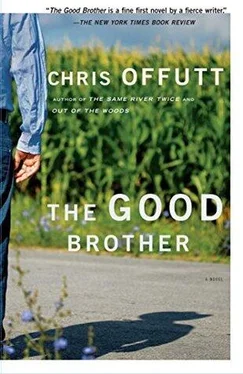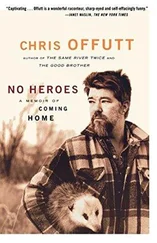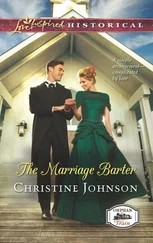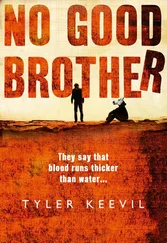“Wouldn’t it be something,” he said, “if there was a million dollars stuffed inside you. Even a thousand dollars. But don’t you worry, I won’t cut you open. Not on your life. I’ll never hurt you. Never.”
A crackling sound outside stopped him. He walked slowly to his bureau for his pistol and eased the safety off. He peered out each window but saw only snow, sky, and the dark wall of trees. His heart was beating fast. He heard the sound again. It came from the front of the cabin. He jerked the door open and stayed behind it, peeking through the crack between door and jamb. The sound came again. Very quickly, he stepped around the door, leading with the pistol. A squirrel stood immobile on the woodpile. It stared at Joe for a long time before biting into a pine cone.
Joe’s hands were trembling, and sweat soaked into his long underwear. He turned from the door, placed the gun on the refrigerator, and kicked the stove until its door caved in. He flipped the kitchen table on its side. He hurled his few dishes across the room, and knocked his canned goods to the floor. He emptied the drawers and ran through the house with a saucepan, beating the walls and doors. He threw his sleeping bag to the floor and stomped it until he tripped himself. In the bathroom, he stared at the mirror briefly before smashing his forehead against it. When he pulled his head away, a shard fell to the sink.
He ran outside without his coat and kept running to stay warm. His breath turned to ice on his beard. He leaned against a tree and heard his ragged breathing, his lungs aching in the cold. He followed coyote tracks along the frozen lane of a gully that fed Rock Creek. Twice his foot broke through the ice. The coyote had its own troubles, visible in the occasional wild scrapes and slides in the snow. There was a sudden spotting of estrus, and Joe recalled Rodale’s dark blood glistening in the night.
The tracks veered left and Joe rested beneath a tall pine. Brown needles covered the ground like sand. None of the pine trees in Kentucky were this big. He had no purpose in the woods, served no function. The coyote hunted game while deer ate bark. Geese had a flock. The ram he’d seen had a mate somewhere on the mountain. He was sick of himself. Terror rippled through him. For the first time in his life, his thoughts scared him. He could not be alone any longer.
He circled his cabin through the open woods and headed for Ty’s house. Juniper trees rose from a talus slope patched with snow. Ty’s pickup truck was parked a foot from his door, and Joe knocked but there was no answer. He knocked again, banging until his knuckles were raw. Ty stepped around the corner of the cabin holding a rifle.
“You all right?” he said.
“I don’t know,” Joe shivered in the wind. “Maybe not,”
“Let me let you in.”
Ty opened the door and motioned Joe to a couch. The coffee table was strewn with parts of a dismantled pistol. A gun cleaning kit lay open, its rods and patches neatly ordered. Ty placed his rifle on a wall rack that held four other weapons.
“Been hunting?” Joe said.
“No. I don’t get many visitors.”
“You must be getting jumpy as me.”
“It’s February,” Ty said. “Cabin fever sets in hard. The Crow people have a tradition of not gossiping after the first snow,”
“Why’s that?”
“Too easy to hurt people’s feelings and get somebody killed before the thaw.”
“Well, I didn’t come over to gossip.”
“Would you like tea?” Ty said. “I have chamomile. The Etruscans used it for snakebite.”
“Sure.”
The cabin was bigger than Joe’s, lined with the same pine panels. The stove was new and the room was very warm. Beside an easy chair was a bag containing two long needles and several skeins of yarn. A shortwave radio sat on the other side. A pair of half-rim reading glasses lay on a small table. Scattered about the room were several books, which Joe inspected while he waited. There were treatises on philosophy, history, and religion, manuals for converting semi-automatic weapons to fall auto, and several accounts of armed battle, from the Peloponnesian War to the most recent American conflicts. Four different Bibles were stacked beside the knitting bag.
The walls held contour maps of Rock Creek and the Bitterroot Valley to the west, Joe found the place where they were joined by Skalkaho Pass. Another map traced Rock Creek to its headwaters. In a corner there was a vise and a grinding wheel bolted to a heavy, homemade table. Pieces of metal lay along the surfaces. The cabin smelled of gun oil and cinnamon.
Ty came into the room carrying mugs with spoons protruding like chimneys for the rising steam. He sat in the easy chair with a directional lamp behind him. He was chubbier than Joe remembered. They sipped their tea in silence. It tasted odd, like clay dirt, but the heat calmed Joe.
“Nice place,” Joe said. “You knit?”
“Something I learned in Alaska. You got to have a lot of home projects in winter. How do you think the Swiss got so good at making watches? I’ve tried it all — beadwork, leatherwork, knife-making, even candle-making. You need something that doesn’t take up much space and won’t accumulate. What do you do in your place?”
“Nothing really. Walk. Chop wood. Been playing poker in town some. I sleep a lot.”
“Yeah, most people do. They eat, get fat, get depressed, and eat more. Then before you know it they’re killing their wife and kids. Drinking’s no good either, but a lot pass the winter that way.”
“I’ve seen a bunch of drunks, all right.”
“Try Alaska. People go up there for work, but the best way to get rich in Alaska is to open a saloon. I guess I been stuck in here awhile, the way I’m talking. You don’t notice it until somebody visits, do you?”
“I don’t know. I haven’t had a visitor. You’re the only person I know.”
“It takes a while. People like to see if you’ll last more than one winter. Go two years and you’ll be all right. What do you make of Montana so far?”
“Long winter.”
“People spend half their life fighting weather. In Alaska it’s more like three-quarters.”
“I don’t much care for fighting.” Joe gestured to the weapons around the room. “You look like you might.”
“Not me. I just tinker till spring. I don’t even hunt. Me, I’m what they call a gun enthusiast.”
Ty lifted the teabag with his spoon, wrapped the string around the bag, and used it to squeeze the remaining tea into the mug. There was a delicacy to the act that amused Joe.
“Look,” Ty said. “I know how it is to come here and not know anybody. Same thing happened to me. Hell, I’m from the Bronx.”
“Where’s that at?”
“New York City, man.”
“Never been there.”
“You wouldn’t like it. Surprising how many New Yorkers live in Montana. Thing about the West, anybody can come out here and fit in, because there’s not much to fit in with. Leave people alone and they won’t bother you. Same as New York.”
“Where I’m from’s like that, too.”
“Used to be that way all over the country. Now people are scared, and the laws don’t have anything to do with crime anymore.”
“Like the new gun laws.”
“You got it, brother. Most gun owners are men over thirty. They have a family and they start thinking about how to protect it. That’s only natural.”
“I know many a woman who can shoot pretty good.”
“That’s true, in the South and the West especially. You see, in the city a gun is a threat, but in the country it’s a tool for defense. Back east, they don’t want their criminals to have guns, so they take everyone else’s.”
“Because they got more crime?”
Читать дальше












